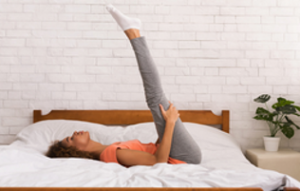Believe it or not, we crave exercise. I know many would disagree because they procrastinate and find reasons why they can’t undertake some mild physical activity.
They are too old, they are too tired, they don’t have time, or they worked hard all day and don’t need more tasks that resemble work.
In truth, none of those arguments are good enough not to follow a bedtime routine. And although stretching is a form of physical activity, it is not robust or vigorous.
Contrarily, it is soothing, and makes the body conducive to sleep. You’ll fall asleep faster, and sleep more peacefully, feeling rested the next morning.
After having done a few stretches for a week or so, you will see what we mean. Your body will want and crave the activity if you miss a few days. Your body will tell you it recognizes the benefits of stretching before bed.
9 Frequently Asked Questions About Relaxing Stretching Before Bed
To help better understand this concept and allay your fears, we have compiled a list of nine common questions we see asked all the time on different forums, sites, and search engines around the internet.
We figured it would be easier for you if we answered all those questions right here.
#1 Is Stretching Before Bed A Good Idea?
 This is probably the most asked question of all. A lot of people are understandably nervous about activities before bed because they assume that the body will be revved up and not able to sleep.
This is probably the most asked question of all. A lot of people are understandably nervous about activities before bed because they assume that the body will be revved up and not able to sleep.
And this does sound logical. In fact, with children, it is better for them to have some calming downtime before trying to sleep.
Yet, studies have shown that mild stretching to help with aches and pains, can also get the body ready for sleeping. The right stretches clear the mind, encourage blood flow, increase oxygen levels, and reduce the risk of nighttime cramping.
As long as the regimen is not vigorous, with you bouncing and jumping all around, you will find the stretches to be quite relaxing.
We are also not talking about a long hour of hard exercise. So, please don’t bother to turn on the work-out videos when thinking about the benefits of stretching before bed.
You can either do them while watching your favorite TV program or by listening to some soft music to get you in the proper mood.
#2 Can I Do Stretching Before Bed?
We do recommend stretching before bed, but at the same time, we don’t necessarily mean the minute you are ready to go to bed.
Some people do prefer to do the stretching exercises right on their bed, but others really are too exhausted to do that. They might fall sleep before they even get the routine done.
Instead, it is probably better to get it done, about thirty to sixty minutes before the actual time you get into bed. You’ll be in a better frame of mind and won’t be so focused on laying your head down.
Further, to get your best night’s sleep, it is always not so easy to do the exercises properly on a bed mattress. Although it may be quite firm for sleeping, it is not rigid enough for supporting the body while stretching out.
For example, you might want to use the kitchen chair for support. Or you might find that you need the solid flat area of the floor for some body stretches.
So soothe your muscles, stretch out those tight tendons, relieve some stress, and find yourself in a better position to wake up more flexible than before. That’s some of the reasons why you can do stretching before bed.
#3 How Long Is Good Enough?
This is another question we get asked all the time. Obviously, most people don’t want to do more physical activity than they have done throughout the day, nor do they want to take up precious time for something they are not sure about.
We understand that. And to be honest, it does depend a little on how wound up you are.
For instance, when something has bothered you all day, you are probably more upset than usual. It might take a few more exercises to get your mind rid of the negativity before you can actually feel calm enough to sleep.
For the most part, though, even five minutes of mild body lengthening will amp up the benefits of stretching before bed. To start, just do what you are capable of, and as you progress over the days and weeks, you will find that you can add to your routine.
You will be able to do a few more helpful stretches, or you can do a couple more repetitions for those days, and body parts, that need a little more attention.
#4 Stretching Before Bed Or In The Morning?
It is normal to wonder whether you should complete your stretching regimen in the morning when you get up or in the evening before you go to bed.
On the one side of the debate, stretching at bedtime relaxes you and gets your body ready to sleep faster and more peacefully.
On the other hand, doing your stretches in the morning gets your body ready for the day’s work and activities ahead. Your muscles are more flexible and much stronger, so that whatever you do, your body should cope better, plus it reduces the risks of injury.
Despite the fact that stretching, in general, is done to increase flexibility and movement, decrease pain, remove tightness, and keep the body parts in sync, stretching at bedtime versus stretching in the morning achieves different purposes or goals.
And some individuals may find it necessary or beneficial to do both.
Let’s take a look at four more areas where the benefits of stretching before bed are clearly evident.
#5 Stretching Before Bed For Athletes
You might wonder why an athlete needs to stretch out when they have already performed a good amount of physical endurance during their practices or actual games and competitions.
One of the main reasons athletes appreciate stretching before bed is the fact that their muscles may be sore and tight from repetitive actions. It may be difficult to move around properly, and they need something to get their bodies back in action.
To gain increased mobility, and reduce the tender hotspots, they complete a routine of stretches to end their day.
#6 Stretching Before Bed Bodybuilding
Bodybuilding is a painstaking sport. It takes a lot of physical punishment with the heavy weights and unchanging motions.
When trying to sculpt a single part of the body, the routine can become excessive.
In fact, you’ll often find that bodybuilders add Yoga to their routines so that they have the balance of harsh and soft movements.
#7 Does Stretching Before Bed Help You Lose Weight?
While stretching is such a gentle exercise, it is hard to believe that it can help you lose weight.
But, the truth is, it does burn calories. Of course, not as many as more vigorous activities, but still, being able to get rid of a few extra pounds is another one of the benefits of stretching before bed.
Plus, the stretching helps to tone the body, reducing flabby spots, and making the body look firmer and more lean.
Finally, if you have been following a regimen of consistent activity during the day to help with your weight loss goals, your body will thank you for the calming stretching activity before bed.
#8 Does Stretching Before Bed Help You Sleep?
The short answer is absolutely!
- Stretching clears your mind so that it is not racing, keeping you awake and wondering about the next day.
- Stretching increases the blood flow so that all your organs are working at peak performance. The heart, in particular, does not have to pump as hard when it has proper blood flow. And, for many people, hypertension can be reduced.
- Stretching increases air flow to oxygenate the lungs with new air so they can work better and improve breathing.
- Stretching helps to prevent cramping of the legs and toes that can be quite irritating and even painful when trying to sleep. For some people that suffer with restless leg syndrome, stretches have helped to reduce the crawling sensation.
- Stretching calms the body so that you can sleep quicker and more rested.
- Stretching creates a sense of euphoria. Simply put, you just feel good after stretching out the day’s negativity. Endorphins are released and the body parts are in harmony.
#9 How To Stretch Your Body Before Bed?
There are a couple points that are important to understand when discussing the benefits of stretching before bed.
- Stretching should not be vigorous. You want to be calmer, not revved up and ready to go.
- Static stretches are the recommended type of exercise before bed. They stimulate the parasympathetic nervous system (parasympaticus), which regulates rest, thus, making you drowsy, and ready to sleep.
- Avoid dynamic stretching before bed. It triggers the sympathetic nervous system (sympaticus), which results in the production of adrenaline. You don’t want to be all geared up ready to perform other activities when you should be sleeping.
- Stretching should be soothing. It should not hurt. You most likely already have sore muscles and inflexible tendons. The aim of nighttime stretching before bed is to make you feel better, not worse. It should calm your mind, body and soul.
- Stretching before bed is not a marathon. It only requires a few short minutes to actually feel good. Probably no more than fifteen minutes is required to help your body shut down and sleep. Don’t overdo it or it will have the reverse effect and keep you awake.
Final Thoughts on Benefits of Stretching Before Bed
We all have good and bad habits. Most of us do make an attempt to increase the number of good habits we subscribe to.
That’s why millions of people make New Year’s resolutions. They want to change their existing ways for something they believe is better.
Since the benefits of stretching before bed are so numerous in relation to the short time it takes to perform them, why not make stretching a new part of your nighttime routine?

